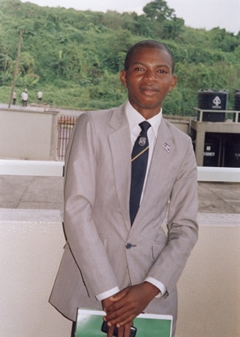Alltech Young Scientist - Apeh Omede - Researching Heat Stress in Poultry

Apeh A. Omede - Federal University of Technology, Owerri, Nigeria - AYS First Place Graduate Winner, Africa-Middle East Region
Apeh A. Omede is a bright young animal science student, studying poultry heat stress at the Federal University of Technology, Owerri, Nigeria. He is a regional winner in the 2011 Alltech Young Scientist competition. We asked him to describe his research and his interest in science.
Q: What did you research?
A: My paper was a review on "Pre-natal Acclimation of Poultry Birds to Heat Stress in the Tropics".
I was trying to take an extensive look at research studies conducted on how to enhance thermotolerance in poultry birds in the hot tropics. My major focus was on the successes achieved in such studies and the challenges faced in finding ways to improve poultry thermotolerance. Basically, my interest was to compare studies relating the manipulation of incubation temperatures in order to achieve thermotolerance and improved performance of birds in their later life. I also attempted to give a way forward from my observations on how to achieve further success in solving the problem of heat stress in poultry birds in the tropics.
Q: What inspired you to explore this topic?
A: Knowing that heat stress is one of the major causes of economic loss in poultry production in the hot tropics, I was inspired to explore this topic because I wanted to know if there are possibilities of enhancing birds ability to cope with the increasing problem of rise in global environmental temperature which in turn will increase heat stress problems in poultry production, especially in the hot tropics. Also, the issue I explored is peculiar to Africa and Middle East region, within which my country, Nigeria is located. That is to say, poultry farmers in my country suffer more loss from heat stress related problems than farmers from other temperate regions of the world. I wanted to identify the information gap existing among previous pre-natal acclimation studies in birds and chart a course for future studies on poultry heat stress in the hot tropics.
Q: How did you become interested in science?
A: My interest in science was first triggered by reading about how scientists have made the world a very beautiful place in which to live through their inventions and discoveries. I felt that science holds the key to improving the livelihood of the world's population; that it can help us live more comfortable lives. However, my venture into Agricultural Science and eventually Animal Science was inspired by a dream to contribute to the pursuit of sustainability for mankind and global food security, especially among the rural poor people in my community. Guidance from my professors later on in my studies added to my inspiration to pursue a career in science.
Q: What would you like to do when you graduate?
A: When I graduate, I will continue to follow my passion for science. I would like to work in research and teaching, so I can use the skills I have developed to make a contribution to both activities. Later on in my career, I'd love to mentor younger scientists too.
All Categories
Archives
- 五月 2014 (6)
- 二月 2014 (1)
- 八月 2013 (1)
- 七月 2013 (1)
- 六月 2013 (4)
- 五月 2013 (17)
- 九月 2012 (1)
- 八月 2012 (22)
- 七月 2012 (1)
- 五月 2012 (24)
- 四月 2012 (2)
- 三月 2012 (12)
- 一月 2012 (7)
- 十二月 2011 (10)
- 十一月 2011 (12)
- 十月 2011 (2)
- 九月 2011 (4)
- 八月 2011 (12)
- 七月 2011 (10)
- 六月 2011 (11)
- 五月 2011 (35)
- 四月 2011 (4)
- 三月 2011 (10)
- 二月 2011 (12)
- 一月 2011 (13)







